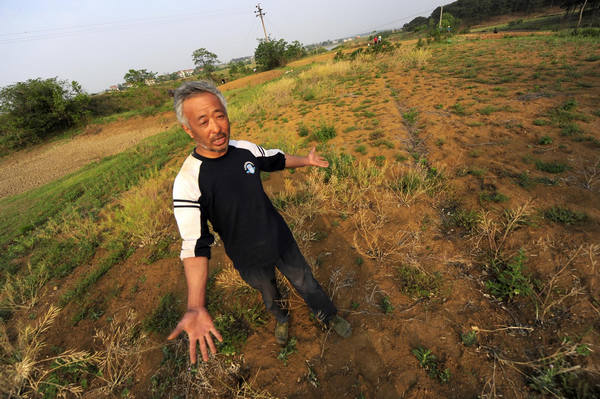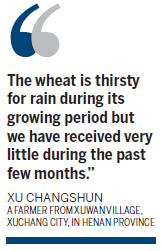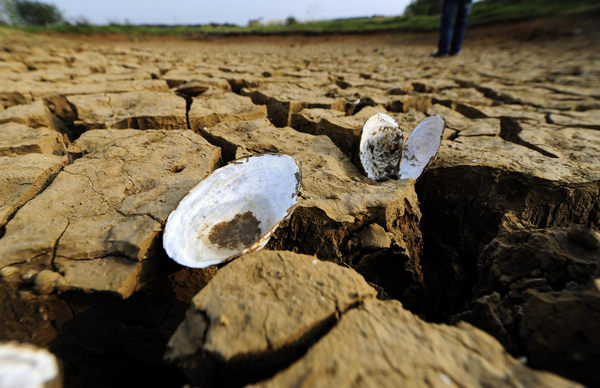Society
Lingering drought threatens harvest across C China
Updated: 2011-05-05 07:19
By Guo Rui (China Daily)
 Huang Shenghua, a farmer in Xingguang village, Xiaochang county, in Central China's Hubei province, inspects a field of dying rapeseed plants on Tuesday. The province has endured a severe drought for the past five months. [Photos/Xinhua] |
WUHAN - After seeing one of the driest springs on record, farmers in most parts of central and southern China are desperate for rain and worried about the prospect of a failed harvest.
"The wheat is thirsty for rain during its growing period but we have received very little during the past few months," said Xu Changshun, a farmer from Xuwan village, Xuchang city, in Central China's Henan province.
"Although we have had some rain during the past few days, the amount that fell was too small to offer any relief to my crops."
In April, Henan had half its normal amount of rain.
By the end of last month, the drought had affected 1.08 million hectares of farmland in the province, according to data from the local government.
In Central China's Hubei province, about 150,000 people and 50,000 head of livestock have been short of drinking water as a result of the drought, which has also dried up more than half a million hectares.
Sun Youxin, an official from the Hubei Flood Control and Drought Relief Headquarters Office, told China Daily on Wednesday that Hubei had been on emergency alert since May 3 and plowed in more money to fight the drought.
|
 |
Zhou Yuehua, deputy director of the Hubei Provincial Meteorological Bureau's Wuhan regional climate center, said 58 counties and cities in the province were suffering from record low levels of rainfall.
Satellite monitoring data from Zhou's center suggests some reservoirs and lakes along the middle reaches of the Yangtze River have shrunk, with the size of Dongting Lake down to 456 sq m, its smallest size for a decade.
Hubei will definitely see a lower wheat yield this year and the lingering drought is also likely to affect young rice plants, said Governor Wang Guosheng.
The situation in Jiangxi province is no better. Located in the heart of the country's grain-producing belt, it has received only 253 millimeters of rain during the past four months, 53 percent less than that in previous years.
Minimal rainfall this spring has not only crippled the agriculture sector but dried up the region's rivers and reservoirs.
In Jiangsu province, the Biandan River is 1.7 meters deep, its shallowest level for half a century, said Ji Jingde, a local official in charge of maritime affairs.
The stubborn dry spell had, as of Friday, left more than 1 million people and 380,000 head of livestock short of drinking water nationwide, according to the Office of State Flood Control and Drought Relief Headquarters.
The drought has, all told, affected nearly 2 million hectares of farmland in seven provinces, including Guangdong, Hunan, Hubei and Jiangxi, which are the cornerstones of China's grain production.
The possibility of a drop in grain production has fueled concern that higher food prices and rising inflation will follow.
|
|
China's consumer price index rose to 5.4 percent in March, the fastest rise in more than two years, while food prices soared 11.7 percent higher than they were last year.
But Wang Jing, an analyst with the Guan Tong Futures Brokerage Co, says the drought will not have a significant impact on wheat prices, even though it probably will increase expectations that wheat prices will rise in the future.
The price of flour produced by a large mill in Henan province hit 2,480 yuan ($382) per ton on Tuesday, a decrease of 20 yuan from the previous week. However, wheat futures for November rose 0.33 percent on Tuesday to 2,748 yuan per ton.
"The drought will add to the country's inflationary pressures and test the government's ability to tackle inflation," said Huang Dejun, chief analyst with Beijing Orient Agribusiness Consultant Co Ltd.
"The country's grain stocks are large enough to cover weather-related losses because China has recorded seven years of bumper harvests. The country's grain supply is essentially self-sufficient."
Zheng Fengtian, deputy dean of the School of Agricultural Economics and Rural Development at Renmin University of China in Beijing, said the drought has exposed weaknesses in China's water conservancy infrastructure.
Beijing has pledged to invest 4 trillion yuan ($608 billion) in water conservancy projects during the next decade, according to a document issued by the government at the beginning of the year.
"With the government's massive investment in water conservancy, China will have effective drought relief and flood control systems by the end of 2020. Its farmland irrigation infrastructure will also be improved," Zheng said.
Xinhua contributed to this story.
E-paper

Head on
Chinese household care goods producers eye big cities, once stronghold of multinational players
Carving out a spot
Back onto center stage
The Chinese recipe
Specials

Bin Laden dead
The world's most wanted man was killed in a US raid in Pakistan.

British Royal Wedding
Full coverage of the royal wedding of Prince William and Kate Middleton in London. Best wishes

The final frontier
Xinjiang is a mysterious land of extremes that never falls to fascinate.

